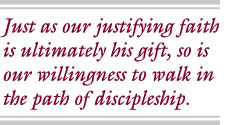Back to series



Discipleship or Grace
Click here to open a Print - Friendly PDF
| Christians can quite easily become subject to a kind of spiritual schizophrenia. On the one hand, we are told that the gospel is a message of grace. God sent his Son into the world to die for our sin so that we might be forgiven. In response we must renounce all efforts at self-justification and put our faith solely in Jesus Christ as our Savior, resting completely in what he has done for us in his finished work on the cross. We are justified by grace alone through faith alone.
But what are we to make of Jesus’ demanding call to discipleship in which we are to give up all that we have and take up our cross and follow him as our Lord? Doesn’t the Christian life entail discipline and a striving to do our duty before God? Aren’t we to run the race set before us, straining for what is ahead, seeking the prize (Heb. 12:1; 1 Cor. 9:24; Phil. 3:13–14)? Aren’t we to learn to obey all that Jesus taught us (Matt. 28:20)? Aren’t we morally obliged to seek holiness? So which is it? How does this call to costly and obedient discipleship relate to the offer of free grace received by faith alone? Some seek to resolve this tension by completely separating the two temporally and theologically. We first believe the gospel and are justified; then we respond to Christ’s call to discipleship and by our own efforts seek to be sanctified. We are first forgiven by faith, and then we are made holy by our own works.
As in marriage, so in theology, much confusion results when we separate what God has joined together. In this article I hope to show that the gracious invitation of the gospel and the costly call to discipleship are not in contradiction but in sublime harmony when certain misperceptions are swept away. To hold these two together we must rightly understand the full scope of the gospel, the proper nature of saving faith, the profound work of the Holy Spirit, and finally the essential foundation of our Christian identity: our union with Christ. The Full Scope of the GospelPart of the confusion Christians experience comes through failing to appreciate all that God promises in the gospel. The gospel is the power of God for the salvation of all who believe, but that salvation doesn’t end with the forgiveness of our sins. God’s saving purpose extends to the restoration of our fallen nature and our conformity to the image of Christ who is the image of God (Rom. 8:29). Nothing less will do. The gospel is a work of God’s grace from first to last, and it promises us a full salvation—not from the penalty of our sin only, but also from its power in our lives, and ultimately even from its presence in the world. Consequently our justification cannot be separated from our sanctification or from our final glorification with Christ (Rom. 8:30). They are all of a piece, aspects of the one saving gospel. Jesus’ call to follow him into a new life of faithful love and obedience to our heavenly Father fits into that broad scope, for it is itself part of God’s gracious work in our lives to redeem us and restore us and to present us to himself as a beautiful and radiant Bride. I appreciate the words of the nineteenth-century Anglican bishop J. C. Ryle on this theme: He who supposes that Jesus Christ only lived and died and rose again in order to provide justification and forgiveness of sins for His people, has yet much to learn. Whether he knows it or not, he is dishonouring our blessed Lord, and making Him only a half Saviour. The Lord Jesus has undertaken everything that His people’s souls require not only to deliver them from the guilt of their sins by His atoning death, but from the dominion of their sin, by placing in their hearts the Holy Spirit; not only to justify them, but also to sanctify them. Our gracious God not only saves us from our sin, he also saves us for God’s glory by remaking us in the image of his Son Jesus Christ. We must understand Christ’s call to discipleship as an integral part of the full scope of God’s gospel in our lives. The Proper Nature of Saving FaithA second misconception that sometimes perplexes believers arises from an inadequate conception of the nature of saving faith. Some think of faith as a mere intellectual assent to a bare theological proposition: Jesus died for my sins. But this oversimplification removes faith from its personal and moral context, which is central to the gospel. Yes, biblical faith involves specific content. This first aspect of faith is what the Reformers called in Latin notitia. It consists of the notions, the ideas, the conceptions that are to be believed. The early Christians sometimes called this “the faith”—the doctrines taught in the Bible about God and man and the revelation of God in a man, Jesus Christ. Paul speaks of the content of our faith in a passage like 1 Corinthians 15:3–4 (cf. also, e.g., 1 Tim. 3:9; 4:6; Titus 1:13). In this sense faith involves knowledge; we must know who Christ is and what he has done before we can believe in him. “Faith comes from hearing the message, and the message is heard through the word of Christ” (Rom. 10:17). And yes, we must affirm the truth of that biblical message. This second aspect of faith is what the Reformers called assensus. We must not only understand the message, we must assent to it. To believe, in a biblical sense, we must come to a conviction about the truth of the gospel. Is there truly a God who created the universe? Did he really enter into our world in Jesus Christ? Did Jesus actually die on a cross for our sins? And did he rise from the dead? Is it true? Biblical faith involves an understanding of certain content—a body of claims about reality; and it involves a conviction about the truth of those claims. But these two dimensions of faith are not enough. Understanding the message is crucial, believing that it is true is essential, but without a third dimension that faith is still deficient. James can speak of such faith as merely the faith of demons (cf. James 2:19). Faith, to be real, must pass from understanding, and even conviction, to personal commitment. This third dimension of faith is what the Reformers called fiducia. Christian faith requires a personal element of trust, reliance and allegiance, for isn’t the gospel a means of restoring a broken relationship?
But marriage requires more than that. Their faith must be put on the line; they must make a commitment to one another—a very personal commitment. Real faith comes only when they forsake all others and say, “I do.” For that reason the marriage vow is called “a pledge of faith.” Our response to the call of Christ in discipleship is simply our “pledge of faith” to him. That response of faith is not our contribution to the saving work of God any more than accepting a marriage proposal earns the love of the one who proposes. It is simply the means of receiving God’s saving grace in Christ. We believe that Christ died for us, but we also believe in him—that is, we entrust ourselves to his care and submit ourselves to his lordship. Saving faith does not mean that we will obey him perfectly, for we are still a part of the old, fallen world, but it does mean that as Lord he has the right to command our obedience. So faith not only has a personal dimension, it also has moral significance. For this reason, an essential aspect of real saving faith is repentance. The gospel message has meaning only within a moral framework, for it assumes that we have rebelled against God’s rightful authority in our lives. We are now sinners in need of a Savior, and to believe the gospel one must agree with this basic truth. Faith in Christ implies that a person no longer wants to remain in this state of rebellion but desires rescue from sin and reconciliation with God. Christian conversion, as Paul describes it, involves “turning from idols to serve the living and true God” (1 Thess. 1:9). Repentance is simply a description of that “change of mind” intrinsic to this turning toward God. It is a recognition of the moral order that God has established, and repentance is a desire to align oneself within that order. And this same call to repentance, this “turning,” is entailed in Jesus’ command to “come, follow me.” Thus, discipleship is inherent in true, repentant faith. The Profound Work of the Holy SpiritA third point of confusion regarding the relationship of grace to discipleship results from a failure to grasp the profound work of the Holy Spirit. Paul’s scathing words to the Galatians ring too true for many Christians: “Are you so foolish? After beginning with the Spirit, are you now trying to attain your goal by human effort?” (Gal. 3:3). Most will acknowledge the central role of the Holy Spirit in conversion. Only by the convicting and regenerating work of the Spirit is saving faith even possible. Our faith is itself a gift of God. Sadly, however, many restrict the Spirit’s work to this initial entry point of the Christian life and assume that they are on their own from that point. They leave the gospel of grace behind. They hear the imperatives of Scripture—the call of discipleship and the demands of holiness—and consider that success depends entirely on human effort. They feel the force of Paul’s admonition to “work out your salvation with fear and trembling” (Phil. 2:12), but they forget to read to the end of the sentence. There Paul grounds his imperative on an essential indicative: “for it is God who works in you to will and to act according to his good purpose” (2:13). The Holy Spirit is not only graciously involved in our conversion but also in the ongoing work of sanctification in our lives. We must not think of the human will as some autonomous force, divorced from the gracious hand of God. The same God who commands also empowers us to respond to those commands. This does not diminish the force of his commands nor our responsibility to obey them. But it gives us hope that obedience is possible, and it results in glory to God when our obedience is realized.
We must realize that in his atoning work on the cross, God acts in Christ outside of us, but his saving work also involves us as persons. God does not act apart from but through our wills—changing us so that we might become like Jesus. Just as our justifying faith is ultimately his gift, so is our willingness to walk in the path of discipleship. They are different aspects of the same reality. The Puritan John Owen reflects on this relationship between our duty and God’s grace: Let us consider what regard we ought to have to our own duty and to the grace of God. Some would separate these things as inconsistent. If holiness be our duty, they would say, there is no room for grace; and if it be the result of grace there is no place for duty. But our duty and God’s grace are nowhere opposed in the matter of sanctification; for one absolutely supposes the other. We cannot perform our duty without the grace of God; nor does God give his grace for any other purpose than that we may perform our duty. We cannot fathom how God’s Spirit works in and through our wills to accomplish his good purpose. We must affirm, however, that he does. Again, as Owen puts it: “God works in us and for us, not against us and without us.” Let us hear the command of Christ in discipleship, and let us respond in obedience, knowing in the end that it is only by the gracious work in us by his Spirit that we are enabled to obey. The Essential Foundation of Christian Identity: Our Union with ChristFinally, the grace of God in the gospel and the demanding call of discipleship find their unity in the essential foundation of Christian identity—our union with Christ. All the benefits that accrue to us from Christ’s work are ours only as we are united to Christ’s Person. To be separate from Christ is to be “without hope and without God in the world” (Eph. 2:12). But to be “in Christ” is to share in all his riches (Eph. 1:3). The Holy Spirit joins us personally to Jesus who died and rose again so that we now share in all that he is. This mysterious union is pictured in various ways in the New Testament, but the horticultural metaphor used by Jesus may be most to the point here: “I am the vine, and you are the branches. If a man remains in me and I in him, he will bear much fruit; apart from me you can do nothing” (John 15:5). In this faith-union with Christ we share in who he is—we are graciously clothed with his righteousness and share in his sonship. But from that life-giving union we also draw the nourishment and strength to live as Christ’s disciples, bearing fruit to his glory. Here is subsumed both the privilege and the responsibility, the grace and the duty, of the Christian life.
This is surely a call to discipleship, for we are to come to Jesus and learn from him (cf. Matt. 4:19; 28:19–20). Yet this call is graciously addressed to those “who are weary and burdened.” “Taking the yoke of Jesus” means submitting to his authority in an unqualified dependence (cf. Matt. 10:37–39). But how could such a thing be considered “easy” and “light” since its demands are more weighty and its content more strict than the law as interpreted by the Pharisees (cf. Matt. 5:17–48)? This is a gracious offer only because of the new relationship with God which Jesus’ yoke (and discipleship itself) makes possible. The yoke we bear is the yoke of the Son who alone makes the Father known (Matt. 11:27). As we commit ourselves to him, we are joined to Jesus the Son such that we, too, become sons of God and so enter into the “rest” which Jesus comes to bring. Grace and discipleship, forgiveness and holiness, are not antithetical but in perfect harmony, for they flow out of and lead into the same reality—our union with Christ. ConclusionChristianity is not a self-help religion, but a relationship with God through Jesus Christ that brings new life by the Spirit that will ultimately result in the restoration of the divine image in us. Faith is our personal response to the Person of Christ, and by the mysterious work of the Holy Spirit we are joined with him. In our union with Christ, we are forgiven and in that union we are regenerated. We now participate in Christ—he is in us by the Spirit, and, in Martin Luther’s words, Christ himself is “the basis, the cause, the source of all our own actual righteousness.” Puritan Jeremiah Burroughs speaks of the connection between growth in personal holiness and the believer’s union with Christ: “from [Christ] as from a fountain, sanctification flows into the souls of the Saints: there sanctification comes not so much from their struggling, and endeavors, and vows, and resolutions, as it comes flowing to them from their closing with Christ and their union with him.” As we entrust ourselves to Christ and depend upon him, we are like branches that draw on the vitality of the vine to produce good fruit. Discipleship is simply the working out of this new life in Christ. We become in ourselves what we are in Christ. The righteousness of Christ imputed to us by faith is imparted to us as we follow him—and it is all by God’s grace. |

William L. Kynes
Pastor, Senior Fellow for Pastoral Theology, CSLI Pastor William L. "Bill" Kynes is the Senior Fellow for Pastoral Theology at the C.S. Lewis Institute, and retired Senior Pastor of Cornerstone, an Evangelical Free Church, in Annandale, VA, where he served from 1986 - 2022. He was an undergraduate at the University of Florida with a major in philosophy. There he also played quarterback and was later inducted into the university’s Athletic Hall of Fame. He attended Oxford University as a Rhodes Scholar, receiving an MA in theology. He received an MDiv from Trinity Evangelical Divinity School, before returning to England for a PhD in New Testament from Cambridge University. From 1997-1999, he served as an adjunct professor in New Testament for the Trinity Evangelical Divinity School Washington, DC, Extension Program.
 COPYRIGHT: This publication is published by C.S. Lewis Institute; 8001 Braddock Road, Suite 301; Springfield, VA 22151. Portions of the publication may be reproduced for noncommercial, local church or ministry use without prior permission. Electronic copies of the PDF files may be duplicated and transmitted via e-mail for personal and church use. Articles may not be modified without prior written permission of the Institute. For questions, contact the Institute: 703.914.5602 or email us.
COPYRIGHT: This publication is published by C.S. Lewis Institute; 8001 Braddock Road, Suite 301; Springfield, VA 22151. Portions of the publication may be reproduced for noncommercial, local church or ministry use without prior permission. Electronic copies of the PDF files may be duplicated and transmitted via e-mail for personal and church use. Articles may not be modified without prior written permission of the Institute. For questions, contact the Institute: 703.914.5602 or email us.
-
Recent Podcasts
The Road Back – Trevor Lancon’s Story
by Trevor Lancon, Jana Harmon on November 15, 2024Deeply involved in his church’s youth group, Trevor...Read More
-
From Politics to Pampers
by Michelle Morgan Knott, Aimee Riegert on November 15, 2024
-
An Unexpected Change – David Westerhoff’s Story
by David Westerhoff on November 8, 2024
-
Recent Publications
Will You Be Ready?
by Thomas A. Tarrants on October 23, 2024Tom Tarrants gives insights on how we can...Read More
-
Should Christians Be Involved with Politics?
by Kerry A. Knott on October 1, 2024
-
Isn ’t Atheism Based on Scientific Fact Whereas Christianity is Based on “Faith”?
by Cameron McAllister on September 1, 2024
0
All Booked
0.00
All Booked
0.00
All Booked
23169
ADVENT CALENDAR: The Amazing Prophecies Fulfilled by the Birth of Jesus Christ
https://www.cslewisinstitute.org/?event=advent-calendar-the-amazing-prophecies-fulfilled-by-the-birth-of-jesus-christ&event_date=2024-11-28®=1
https://www.paypal.com/cgi-bin/webscr
2024-11-28

Next coming event
Days
Hours
Minutes
Seconds
ADVENT CALENDAR: The Amazing Prophecies Fulfilled by the Birth of Jesus Christ
On November 28, 2024 at 6:00 amTags
Speakers

William L. Kynes
Pastor, Senior Fellow for Pastoral Theology, CSLI
Team Members

William L. Kynes
Pastor, Senior Fellow for Pastoral Theology, CSLIPastor William L. "Bill" Kynes is the Senior Fellow for Pastoral Theology at the C.S. Lewis Institute, and retired Senior Pastor of Cornerstone, an Evangelical Free Church, in Annandale, VA, where he served from 1986 - 2022. He was an undergraduate at the University of Florida with a major in philosophy. There he also played quarterback and was later inducted into the university’s Athletic Hall of Fame. He attended Oxford University as a Rhodes Scholar, receiving an MA in theology. He received an MDiv from Trinity Evangelical Divinity School, before returning to England for a PhD in New Testament from Cambridge University. From 1997-1999, he served as an adjunct professor in New Testament for the Trinity Evangelical Divinity School Washington, DC, Extension Program.


 In practice, this bifurcation often means that the second stage in this two-stage process is considered optional, resulting in the category known as “carnal Christians”—those who are justified but not sanctified, believers without obedience. This distortion of the gospel has been rightly labeled “cheap grace.” For others, who put all their stress on the rigors of following Jesus, the Christian life becomes spiritually dysfunctional and deadening, resulting in a frustrating return to the works of the law as the means to please God.
In practice, this bifurcation often means that the second stage in this two-stage process is considered optional, resulting in the category known as “carnal Christians”—those who are justified but not sanctified, believers without obedience. This distortion of the gospel has been rightly labeled “cheap grace.” For others, who put all their stress on the rigors of following Jesus, the Christian life becomes spiritually dysfunctional and deadening, resulting in a frustrating return to the works of the law as the means to please God. Consider the analogy of the most intimate of human relationships, that of marriage. A man and a woman may be attracted to each other and may get to know the content of each other’s character. They may become convinced that they would make good marriage partners.
Consider the analogy of the most intimate of human relationships, that of marriage. A man and a woman may be attracted to each other and may get to know the content of each other’s character. They may become convinced that they would make good marriage partners. This profound work of the Spirit is what the prophets of the Old Testament spoke of so clearly. Ezekiel prophesied a coming day when the Lord would act powerfully to overcome the sin of his people—”I will give you a new heart and put a new spirit in you; I will remove from you your heart of stone and give you a heart of flesh. And I will put my Spirit in you and move you to follow my decrees and be careful to keep my laws” (Ezek. 36:26–27).This is the promise of the New Covenant of which Jeremiah spoke when he declared that the Lord would “put [his] law in their minds and write it on their hearts” (Jer. 31:31–34). We now live in that new age inaugurated by the death and resurrection of Jesus Christ.
This profound work of the Spirit is what the prophets of the Old Testament spoke of so clearly. Ezekiel prophesied a coming day when the Lord would act powerfully to overcome the sin of his people—”I will give you a new heart and put a new spirit in you; I will remove from you your heart of stone and give you a heart of flesh. And I will put my Spirit in you and move you to follow my decrees and be careful to keep my laws” (Ezek. 36:26–27).This is the promise of the New Covenant of which Jeremiah spoke when he declared that the Lord would “put [his] law in their minds and write it on their hearts” (Jer. 31:31–34). We now live in that new age inaugurated by the death and resurrection of Jesus Christ. The famous words of Jesus in Matthew 11:28–30 illustrate well the two sides of grace and discipleship grounded in union with Christ: “Come to me, all you who are weary and burdened, and I will give you rest. Take my yoke upon you and learn from me, for I am gentle and humble in heart, and you will find rest for your souls. For my yoke is easy and my burden is light.”
The famous words of Jesus in Matthew 11:28–30 illustrate well the two sides of grace and discipleship grounded in union with Christ: “Come to me, all you who are weary and burdened, and I will give you rest. Take my yoke upon you and learn from me, for I am gentle and humble in heart, and you will find rest for your souls. For my yoke is easy and my burden is light.”

